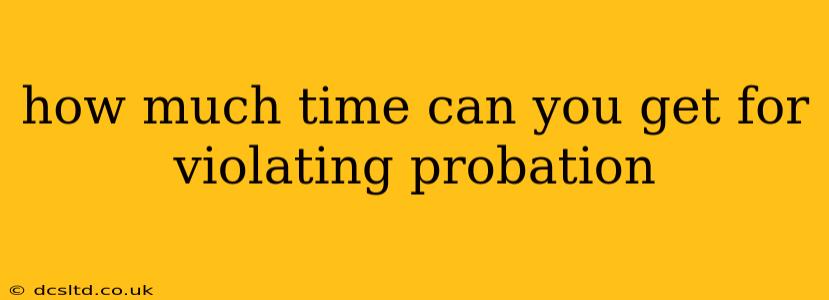How Much Time Can You Get for Violating Probation?
Violating probation can have serious consequences, leading to a significant increase in your sentence. The amount of time you could face depends on several crucial factors, making it impossible to give a single definitive answer. This article will explore those factors and help you understand the potential ramifications of probation violation.
Understanding Probation:
Probation is a court-ordered alternative to incarceration, allowing individuals convicted of a crime to remain in the community under specific conditions. These conditions can vary widely, depending on the severity of the offense and the judge's discretion. Common conditions include regular check-ins with a probation officer, drug testing, maintaining employment, and avoiding certain people or places. Failure to comply with these terms constitutes a violation.
Factors Determining the Severity of Punishment for Probation Violation:
Several factors influence the consequences of a probation violation. The judge will consider these aspects before determining the appropriate punishment:
-
Severity of the Original Offense: A violation stemming from a serious felony will likely result in a harsher penalty than a violation connected to a minor misdemeanor.
-
Nature of the Violation: Was the violation technical (a minor infraction like missing a meeting) or substantive (a new arrest or committing a new crime)? Substantive violations are far more serious.
-
Your Probation History: Have you had prior probation violations? A pattern of violations demonstrates a lack of compliance and increases the likelihood of a stricter penalty.
-
Your Attitude and Cooperation: A defendant who demonstrates remorse and actively cooperates with their probation officer is more likely to receive leniency. Conversely, defiance or lack of cooperation will likely lead to more severe consequences.
-
Jurisdictional Laws: State and federal laws vary, impacting the possible penalties for probation violations.
What Happens During a Probation Violation Hearing?
If your probation officer believes you've violated your probation, they will file a report with the court. This triggers a hearing where you have the right to legal representation and present your defense. The judge will review the evidence and determine whether a violation occurred.
Possible Consequences of a Probation Violation:
The potential punishments for violating probation range from relatively minor consequences to imprisonment:
-
Increased Supervision: The judge might impose stricter supervision, such as more frequent check-ins or additional conditions.
-
Community Service: Additional community service hours may be required.
-
Fines: You could face additional financial penalties.
-
Jail Time: This is a very real possibility, especially for substantive violations. The amount of time served could range from a few days to the full length of the original sentence. In some cases, individuals are sent to prison for the remainder of their original sentence.
-
Revocation of Probation: In the most severe cases, probation might be revoked entirely, and the original sentence will be imposed.
How Long Could You Be Sent to Jail for a Probation Violation?
There's no single answer. The length of a jail sentence for a probation violation depends entirely on the factors discussed above. It could be a few days, a few months, or even the entire length of your original sentence.
Can You Avoid Jail Time for a Probation Violation?
It's possible, but it's not guaranteed. Demonstrating remorse, cooperating fully with your probation officer, and having a strong legal defense significantly increase your chances of avoiding jail time. However, the ultimate decision rests with the judge.
What Should You Do if You're Facing a Probation Violation?
If you're facing a probation violation, immediately seek legal counsel. An experienced attorney can explain your rights, help you build a defense, and navigate the legal process to achieve the best possible outcome. Don't attempt to handle this alone.
Disclaimer: This information is for educational purposes only and does not constitute legal advice. Laws concerning probation violations vary significantly by jurisdiction. It's crucial to consult with a legal professional for guidance specific to your situation.
